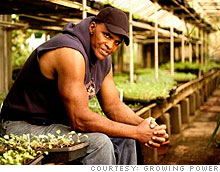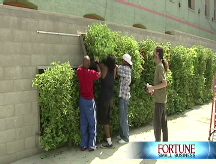Growing farmers in the inner cities
MacArthur Fellow Will Allen turned the last two acres of farmland in Milwaukee into the headquarters for an urban agriculture resurgence.
(Fortune Small Business) -- The son of a South Carolina sharecropper, Will Allen likes to say he was getting back to his roots in 1993 when he purchased the last remaining farmland within Milwaukee's city limits.
Allen, 59, had just retired from a career in corporate marketing at Procter & Gamble (PG, Fortune 500) that had followed a couple of seasons as a professional basketball player. He turned his two acres into the business headquarters, training grounds, retail distribution center and laboratory for Growing Power, an agricultural enterprise that brings fresh produce to "food deserts" - inner-city neighborhoods with no produce stores. His efforts recently won him a $500,000 MacArthur Foundation Fellowship.
FSB: How would you describe the Growing Power business model?
WILL ALLEN: Taking advantage of a major imbalance between supply and demand. Right now, less than 1% of food consumed in major cities is produced locally, whereas in survey after survey, the majority of urban residents declare a strong preference for locally grown food. The crisis of climate change is helping drive that demand too. So are the imported-food scares. Urban ag is hot right now. People want to know their farmers again.
FSB: Any lessons learned in professional basketball that apply to business?
ALLEN: Actually, there are. I run Growing Power like it's a sports franchise, basing the organization on team-oriented concepts. That means we have stars and coaches and role-players with specialized skills, but we're all treated as equally important. Also, we understand that we don't have to be successful every single day to be successful overall. Instead, the goal is to have substantially more winning days than losing days.
FSB: What challenges have you encountered in developing a workforce among inner-city youth?
ALLEN: Overcoming their negative association with farming, because slavery didn't end with the Civil War. In a way it continued with sharecropping. And a lot of kids in low-income neighborhoods equate farming with being used and abused as cheap labor. So part of our system is to re-engineer their mind-set, to inspire and engage them and the larger community. We're not just growing food, we're growing farmers.
FSB: What are you going to do with the $500,000?
ALLEN: I haven't really had the time to think through the specifics yet, but I can tell you this much: I'm going to grow more food for people, and I'm going to send kids to college. ![]()
Building a berry business in the Amazon - and Utah
Eat my wall: A vertical urban farm will seed community farming in a graffiti-scarred L.A. neighborhood.
-
The Cheesecake Factory created smaller portions to survive the downturn. Play
-
A breeder of award-winning marijuana seeds is following the money and heading to the U.S. More
-
Most small businesses die within five years, but Amish businesses have a survival rate north of 90%. More
-
The 10 most popular franchise brands over the past decade -- and their failure rates. More
-
These firms are the last left in America making iconic products now in their twilight. More










